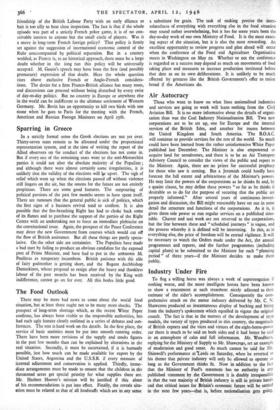The Food Outlook
There may be more bad news to come about the world food situation, but at least there ought not to be many more shocks. The prospect of long-term shortage which, as the recent White Paper confirms, has always been visible to the responsible authorities, has had each ugly feature clearly outlined in a series of debates and con- ferences. The rest is hard work on the details. In the first place, the service of basic statistics must be put into smooth running order. There have been more revisions of the supply and stocks figures in the past few months than can be explained by alterations in the real situation. Secondly, it must be ascertained, if it is humanly possible, just how much can be made available for export by the United States, Argentina and the U.S.S.R. if every measure of internal adjustment and conservation is applied. Thirdly, imme- diate arrangements must be made to ensure that the children in the threatened areas get special priority for what supplies there are. Mr. Herbert Hoover's mission will be justified if this alone of his recommendations is put into effect. Finally, the cereals situ- ation must be related to that of all foodstuffs which are in any sense
a substitute for grain. The task of making precise the inter- relatedness of everything with everything else in the food situation may sound rather overwhelming, but it has for some years been the day-to-day work of our own Ministry of Food. It is the most exact- ing aspect of the situation, but it is also the most rewarding. An excellent opportunity to review progress and plan ahead will occur when the conference of the Food and Agriculture Organisation meets in Washington on May 20. Whether or not the conference is regarded as a success may depend as much on movements of food taking place and measures to increase production instituted before that date as on its own deliberations. It is unlikely to be much affected by gestures like the British Government's offer to ration bread if the Americans do.


























 Previous page
Previous page